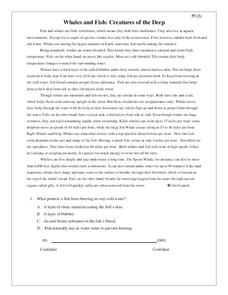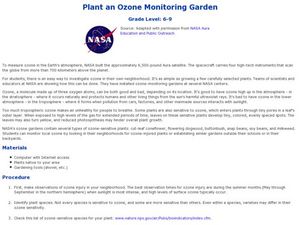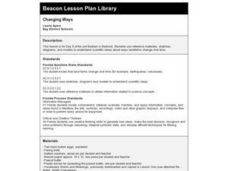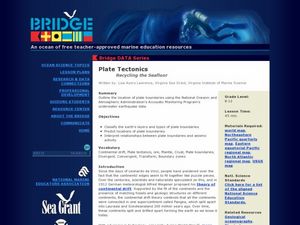Curated OER
Whales and Fish: Creatures of the Deep
Practice comparing and contrasting details in informational text with a reading passage about whales. It explains the ways that fish and whales are similar, as well as the ways they are different, and specific characteristics of various...
Science Matters
Slip Sliding Along
The San Andreas Fault is the largest earthquake-producing fault in California. In the seventh instructional activity in the 20 part series, pupils create maps of California, focusing on the San Andreas Fault system. The comparison...
Curated OER
Vocabulary for Earthquakes and Volcanoes
In this plate tectonics worksheet, students define 27 terms associated with earthquakes and volcanoes such as subduction zone, mantle, and divergent plate.
Curated OER
Biomes: Extreme Climate
Young scholars discuss the causes of global warming. In this earth science lesson, students examine how global warming is connected to the arctic and world climate. They write a paragraph about their interconnection.
Curated OER
Environment: Battling for Oxygen
Students construct an interactive ozone depletion model using gumdrops and toothpicks. After analyzing the data obtained from the model, they record it on butcher paper and complete worksheets about oxygen.
Curated OER
Effects of Ozone in the Air
Fifth graders, in groups, conduct an experiment in which they measure ground level ozone levels using an ozone measuring kit. They analyze and compare the weather conditions and locations where ozone readings are highest and lowest.
Curated OER
Climate Change: Is there a Controversy
Students explore climate changes. In this climate changes lesson, students research what causes changes. Students search the Internet, summarize reports they find and create a poster with the information.
Curated OER
Greenhouse Effect: Pop Bottle Experiment
Students explore global warming by conducting a weather experiment. In this greenhouse gas lesson, students define the greenhouse effect and the impact on our ozone layer. Students utilize a soda pop bottle, floodlight bulb, thermometers...
Curated OER
Greenhouse Gases: The Chemistry Behind the Culprits
Ninth graders investigate the effect of different gases in the atmosphere. In this chemistry activity, 9th graders explain how these gases contribute to global warming. They suggest possible solutions to this growing problem.
Curated OER
Plant an Ozone Monitoring Garden
Students create a garden. In this ozone lesson, students discuss ozone injury, identify plants sensitive to ozone, and then plant their own ozone garden.
Curated OER
Frogs Frogs Frogs
Students view a disk on the continental movement and analyze the given data on fossils, rock types and climate zones. In this geology lesson students draw a diagram of the earths layers, take a quiz complete a PowerPoint presentation.
Curated OER
What's the Connection Between Convection and Inversion?
Ninth graders observe a simulation demonstrating the difference between convection and inversion. They explain where and when convection and inversion layers occur and how each impacts air quality, and by connection, human health.
Curated OER
Using Radiosonde Data From a Weather Balloon Launch
Student use radiosonde data from a weather balloon launch to distinguish the characteristics of the lower atmosphere. They learn the layers of the atmosphere. They graph real atmospheric data.
Curated OER
Ice Core Clues
Students create a PowerPoint presentation on the information they research about the ice cores and what they tell us about Earth's past. In this ice core lesson plan, students research radioactivity, air pollution, sodium, snowfall...
Curated OER
What's the Difference?
Pupils discover how volcanic processes differ at convergent and divergent tectonic plate boundaries. They identify three geologic features that are associated with most volcanoes on Earth.
Curated OER
Weather and Atmosphere
Seventh graders explain the layers of the atmosphere. They identify the causes of air pollution. They analyze real world weather data. They explore and describe clouds. They develop models to explain atmosphere and weather.
Curated OER
Determining the Percolation Rate of Soil
High schoolers discover how water moves through different types of soils. In groups, they use the same sample from a previous activity and empty it into a milk carton in which they have layered with cheesecloth to determine the...
Curated OER
Core
Eighth graders examine conditions that can lead to the formations found and correlate the layers. In this rock layers lesson students complete an activity that allows students to take their own "core sample".
Curated OER
Changing Ways
Third graders examine hard boiled eggs as possible models for the earth's layers.
Curated OER
Oil Trap Model
Students investigate oil accumulation by creating a model in their classroom. In this petroleum geology lesson, students discuss where oil comes from and why it is vital to our society at this particular time. Students cut out a 3-D...
Curated OER
Musical Plates
Sixth graders engage in a study of the plates and how they are part of the formation of the ever changing landscape of planet earth. They access web sites that have applications for observation and conducting different activities. The...
Curated OER
Water Systems
In this water systems worksheet, high schoolers refer to their textbook to complete questions about the amount of water on earth and the portion of water in various forms. Students review porosity, permeability, and water table. This...
Curated OER
Plate Tectonics: Recycling the Seafloor
Students classify earth's layers and plates using Ocean Seismicity data. In this plate tectonics instructional activity, students outline where the plate boundaries are on the world map. They then compare these predicted boundaries with...
Curated OER
Chemical Composition Chart
For this Earth's crust worksheet, students determine the most abundant and least abundant elements in the atmosphere, oceans, and crust. This worksheet has 1 fill in the blank and 11 short answer questions.
Other popular searches
- Science Earth Layers
- Earth Science Earth's Layers
- Earth Science Earth Layer
- Science Layers of the Earth

























